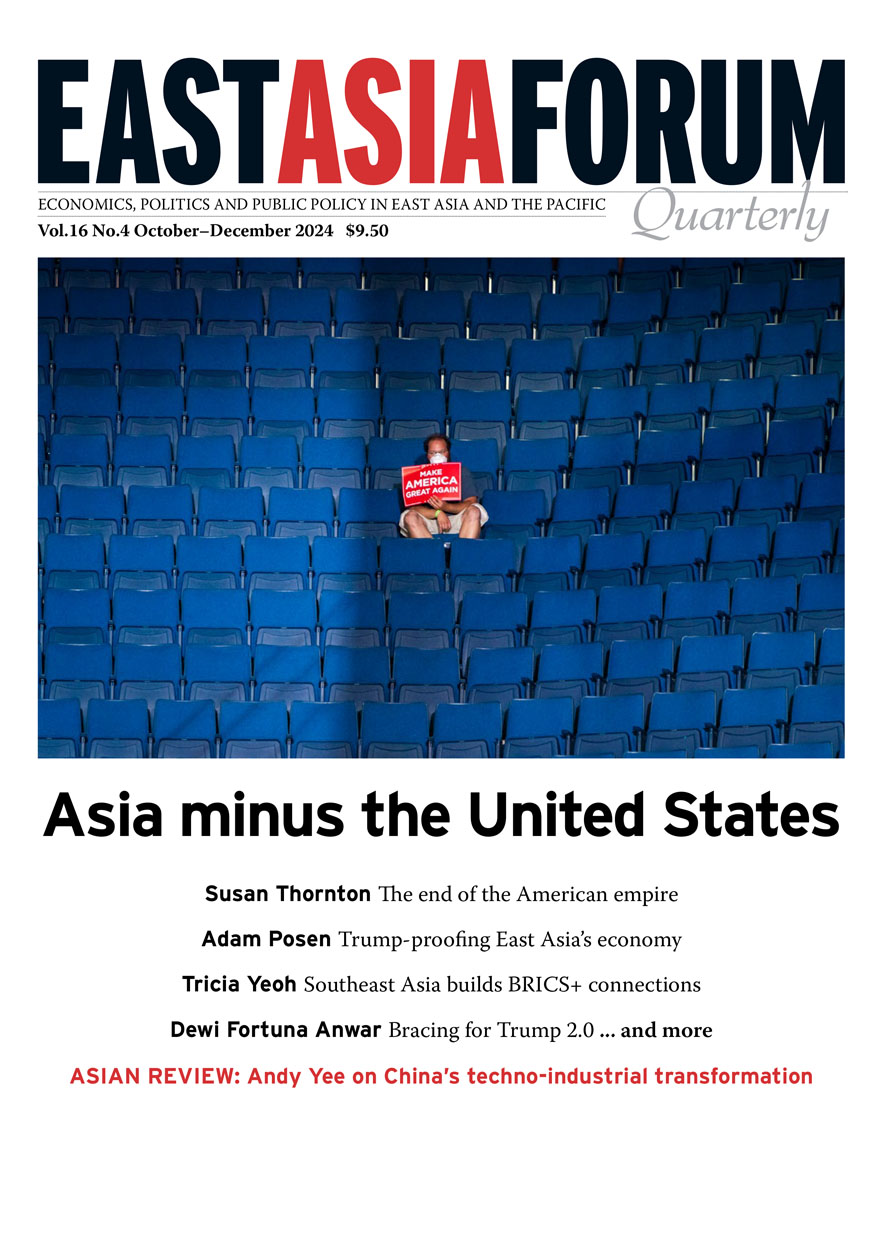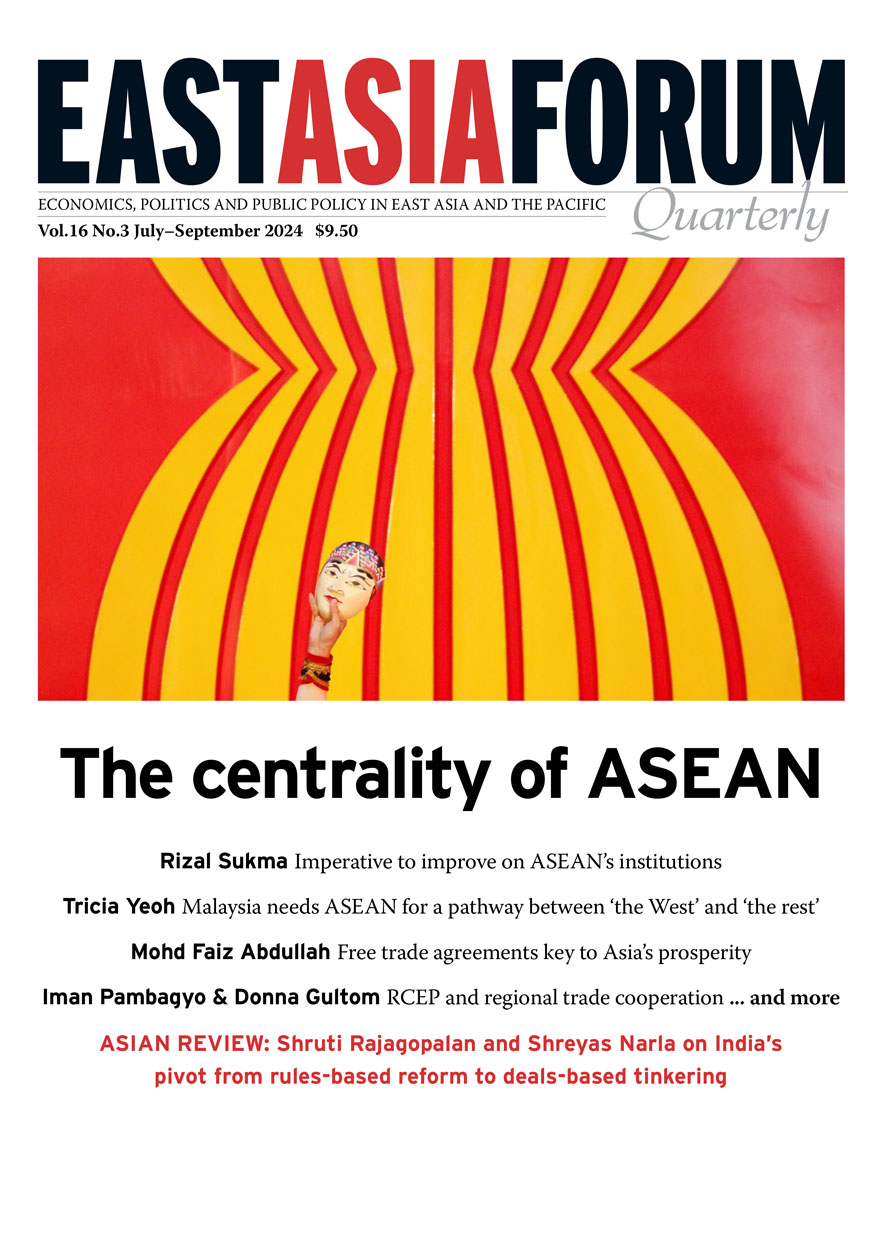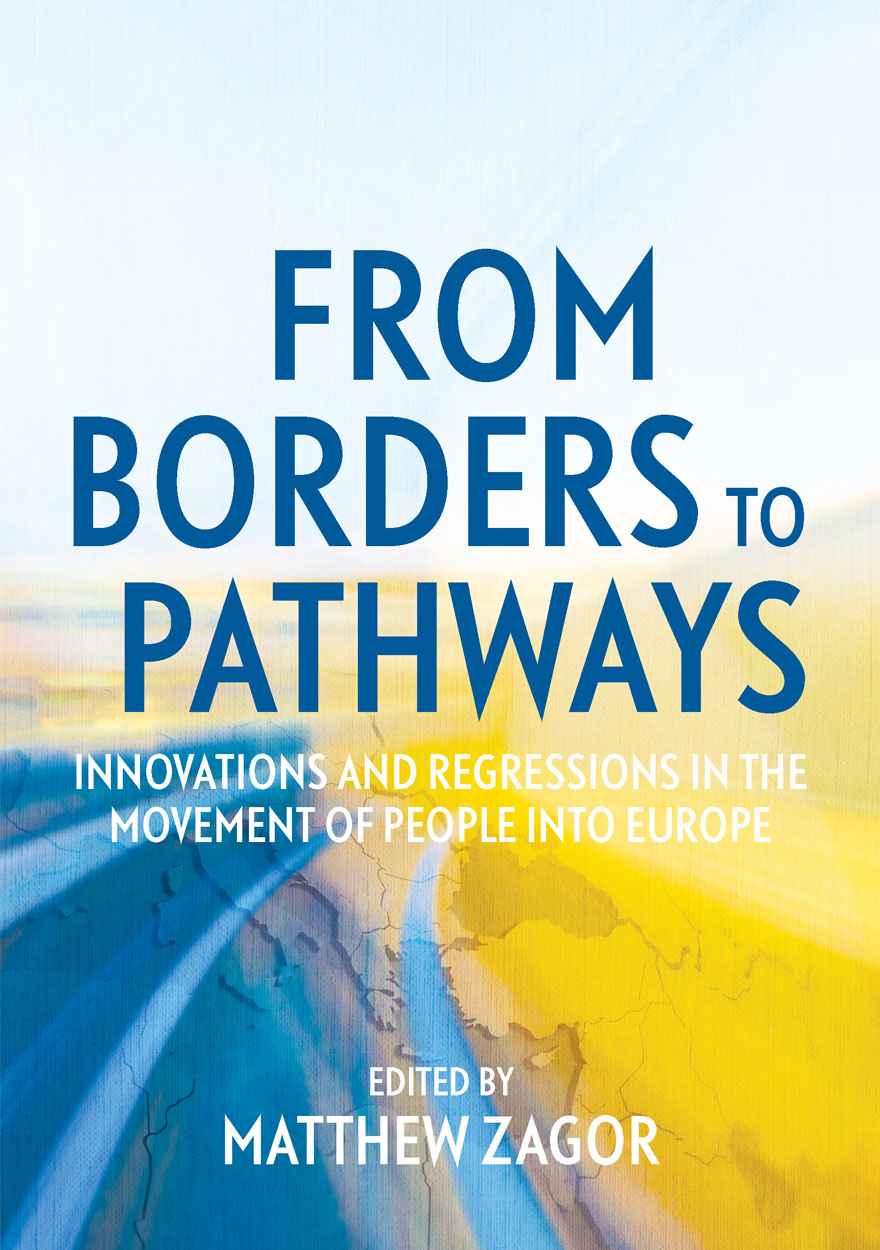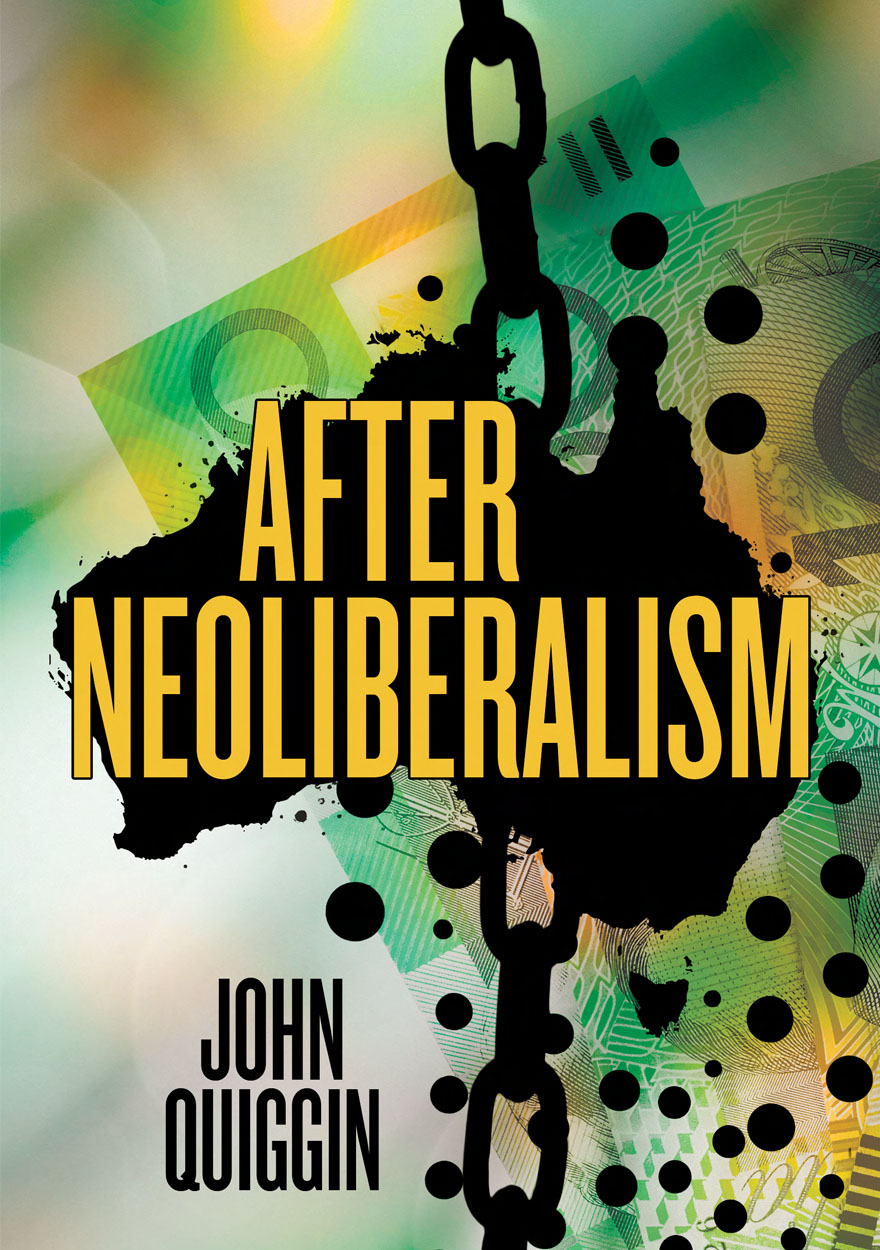Search titles
Displaying results 21 to 30 of 855.

East Asia Forum Quarterly: Volume 16, Number 4, 2024 »
Publication date: December 2024
The global economy’s trajectory toward instability has been evident since Trump 1.0. A second Trump presidency will likely amplify protectionism, strategic competition and global disorder. This edition of East Asia Forum Quarterly examines how Asia can respond, emphasising the region’s role in defending multilateralism, addressing climate change and ensuring global stability.
Download for free
Not available for purchase

Enabling Learning »
Language Teaching for Australian Universities
Publication date: December 2024
Enabling Learning: Language Teaching for Australian Universities illuminates efforts by tertiary language educators to facilitate the learning of languages at the university level. The educators’ endeavours recounted in this volume address a range of specific aspects of the language learning experience or language teaching within tertiary education institutions. The chapters offer an overview of learning approaches and experiences, from the beginner to the advanced level, of different learning environments, from the traditional to online and hybrid, and of different languages, from Indigenous to European to East Asian. This work foregrounds the relevance of improved accessibility to language learning in the university context, presents innovative educational solutions informed by the examination of specific contexts, and asserts the importance of developing intercultural competence.

A Grammar of Warlmanpa »
Authored by: Mitchell Browne
Publication date: November 2024
As spoken by Bunny Naburula, Danny Cooper, Dick Foster, Donald Graham, Doris Kelly, Elizabeth Johnson, George Brown, Gladys Brown, Jack Walker, Jessie Cooper, Jimmy Newcastle, Julie Kelly, Lofty Japaljarri, Louie Martin, May Foster, Norah Graham, Penny Kelly, Penny Williams, Selina Grant, Susannah Nelson, Topsy Walker, Toprail Japaljarri and William Graham.
This volume is a descriptive analysis of Warlmanpa, a highly endangered language traditionally spoken northwest of the town of Tennant Creek, where most of the remaining speakers now live.
This grammatical description is based on language work carried out by community members and linguists since 1952, and is the first published reference grammar of the language.
The major areas of analysis include phonetics, phonology, morphology, and syntax. This volume also provides description of typologically notable features, including: a two-way stop contrast at each place of articulation; a complex second-position auxiliary system containing participant and tense/mood/aspect information; associated motion; and a lack of evidence for noun phrases.
This volume lays the foundation for future Warlmanpa language work.

Ritual Voices of Revelation »
The Origin Narratives of the Rotenese of Eastern Indonesia
Authored by: James J. Fox
Publication date: November 2024
This is a study of a collection of oral compositions of the Rotenese of eastern Indonesia. Recited in semantic parallelism, these compositions require a strict pairing of all words to produce correspondingly ordered verses. These narrative verses create an elevated discourse—a ‘scriptural voice’—intended to reveal the origins of Rotenese cultural life. The translations and exegeses of these origin narratives offer a work of world-class poetic imagination that recounts a dynastic contest between the Sun and Moon and Lords of the Ocean Sea and its epic consequences.
As background to the presentation of these narratives, this study provides a description of Rotenese life expressed in the complementary pairs that the Rotenese themselves use to categorise their world. A concluding chapter examines the Rotenese acquisition of Christianity and the subsequent retelling of the Biblical Genesis in Rotenese parallel verse, thus continuing the general examination of the use of parallelism as elevated ritual discourse. Gathered from poets from two domains on the island, most of these compositions date from fieldwork in 1965–66 and in 1973. The publication of these materials represents the summation of more than fifty years of research.

East Asia Forum Quarterly: Volume 16, Number 3, 2024 »
Publication date: September 2024
ASEAN's rise as the cornerstone of regional diplomacy and security in the 1990s may have seemed improbable, but it was crucial. Today, a shifting regional geopolitical landscape challenges ASEAN’s relevance. Great power competition and waning global political commitment to multilateral arrangements threaten its role as East Asia’s 'steering committee'. This edition of East Asia Forum Quarterly explores how ASEAN can maintain its centrality, calling for proactive leadership and stronger regional cooperation.
Download for free
Not available for purchase

Aboriginal History Journal: Volume 47 »
Edited by: Crystal McKinnon, Ben Silverstein
Publication date: September 2024
This volume opens with Joakim Goldhahn, Sally May, and Jeffrey Lee’s study of renowned Badmardi artist Nayombolmi, best known for his rock art but here considered as an artist who produced a number of bark paintings for collectors in the 1950s and 1960s. They show us how his representation of public stories of Spirit or Ancestral Beings emerges from a negotiation between the artist, collectors, and dealers, shaping the forms in which he shared Badmardi story.
The following two articles take up the theme of negotiation in contexts of segregation. Sam Furphy describes Yorta Yorta memory activism relating to Queen Elizabeth II’s visit to Yorta Yorta Country in 1954, considering memories of the fence that was erected to place Yorta Yorta people beyond the Queen’s view and prevent any direct relationship between peoples. Cameron Raynes continues to study segregation by considering the disastrous health impacts of the colour bar that excluded Aboriginal people of the Point Pearce Station from the nearby Wallaroo and Maitland Hospitals in the early-mid twentieth century.
The next articles turn to relationships between Aboriginal people and colonists in Queensland. In a collaboratively written article, Alice Buhrich, Lewis Richards, Brian Bing, Jimmy Richards, Sharon Prior, Jenny Lacey, Tania Casey and Megan Mosquito narrate a history of past and ongoing Ewamian resistance to European invasion that stands in stark contrast to myths of Ewamian disappearance. Rebeka Manning and Sally Babidge read archives of Queensland pastoral stations for traces of Aboriginal women’s and girls’ domestic service, taking these hints as occasions for Aboriginal storytelling.
The final article, co-authored by members of the Aboriginal History Archive Will Bracks, Coen Brown, Clare Land, Gary Foley, John Hawkes, Kim Kruger, Rochelle le Pere, Natasha Ritchie and Shannon Woodcock, describes the work of that archive to produce a historical understanding that can provide the basis for describing and enacting Aboriginal self-determination.
The volume also includes a series of book reviews, as well as reflections on the life and work of Niel Gunson and Gordon Briscoe, two key figures in Aboriginal History whose influence is evident throughout these pages.

From Borders to Pathways »
Innovations and Regressions in the Movement of People into Europe
Edited by: Matthew Zagor
Publication date: September 2024
From Borders to Pathways: Innovations and Regressions in the Movement of People into Europe examines the evolution of European migration policy, offering a forward-looking analysis that extends beyond traditional border controls to innovative legal migration pathways. Contributors provide an in-depth exploration of the drivers shaping migration policies, including public opinion and the rise of populist discourses, the contrasting responses to various real and imagined migrant crises, and critiques of recent policy innovations such as refugee finance schemes, ‘safe legal pathways’, and migrant lotteries. Through interdisciplinary perspectives, the authors assess socio-political, legal, geo-political and cultural shifts to advocate for a more inclusive, humane and sustainable approach to migration. By challenging dominant narratives of deterrence, extraterritoriality and exclusion, this book advocates for policies that balance Europe’s myriad commitments, values and imperatives, highlighting the need for ethical frameworks that respect the dignity of migrants. Essential reading for policymakers, scholars and stakeholders, From Borders to Pathways offers a comprehensive reflection on the complexities of migration in Europe, signalling a paradigm shift towards cooperation, inclusivity, and shared responsibility in global mobility.

Made in China Journal: Volume 9, Issue 1, 2024 »
Publication date: August 2024
A new Chinese government textbook for university students, An Introduction to the Community of the Zhonghua Race (中华民族共同体概论), promotes President Xi Jinping's vision for governing the country’s diverse population. This approach shifts away from celebrating cultural differences—what the anthropologist Susan McCarthy once termed ‘communist multiculturalism’—and towards a Han-dominant identity, a form of racial nationalism inspired by sociologist Fei Xiaotong’s concept of ‘multiple origins, single body’ (多元一体). While the constitution of the People’s Republic of China as amended in 2018 guarantees minority rights and political autonomy through the framework of ‘minority nationalities’ (少数民族), the textbook suggests that Tibetan, Uyghur, Mongols, and other Indigenous groups should eventually assimilate into Han culture, raising concerns about the future of minority languages and traditions. Xi Jinping's new approach to national unity faced significant resistance from both minority and Han officials. Yet, this resistance only prompted an even more muscular response: revamping government departments, a harsh crackdown in minority-populated areas, and removing minority officials who oversaw ethnic affairs. In this issue of the Made in China journal, we ask contributors to reflect on the state of ethnic minority culture in the wake of Xi’s new ethno-nationalist order and explore what remains of cultural differences at the end of dreams of communist pluralism and ethnic autonomy.

Rebellion at Coranderrk »
Authored by: Diane Barwick
Publication date: August 2024
More than a century ago an Aboriginal community in Victoria campaigned for recognition of their right to occupy and control the small acreage they had farmed for 25 years. Others wanted to develop this tract. Government spokesmen denied that the occupants had inherited any rights to this land and declared that, anyway, they were not really Aborigines. This book is about the rebellion at Coranderrk Aboriginal Station between 1874 and 1886. It describes how Coranderrk families fought to keep their land. To explain why they fought I must begin with the years before, to show what this ‘miserable spadeful of ground’ meant to them, and how they came to be there. Finally, I sketch what ultimately happened.
First published in 1998, 12 years after the death of its author Diane Barwick, Rebellion at Coranderrk was an attempt to rectify some of the injustices of the past two-hundred-plus years in Australia, and to prevent similar occurrences in the future.
It remains acutely relevant.
This book includes the names and images of people who are now deceased.
‘All Australians have good reason to be grateful to Diane Barwick.’
— H. C. Coombs
‘The painstaking research, the perceptive judgements of people and events, and the brilliant prose combine to produce a magnificent account of the Kulin and their European “administrators”. The book is simply packed with historical reinterpretation and vivid reconstructions of families and individuals.’
— C. T. Stannage
‘The author’s research found that Coranderrk is an excellent example of … an Aboriginal (farming) success story. It is very relevant to modern land-rights protests throughout Australia.’
— Canberra Times

After Neoliberalism »
Authored by: John Quiggin
Publication date: July 2024
Since the early 1980s, Australian economic policy has been dominated by the ideology of neoliberalism (also known as ‘economic rationalism’), including policies of privatisation, financial deregulation and micro-economic reform. Throughout this period, John Quiggin has presented critical assessments of neoliberal policies and the claims about productivity growth made in support of those policies.
The credibility of neoliberalism was fatally wounded by the Global Financial Crisis and its aftermath. Nevertheless, market ideology has lumbered on in zombie form, for want of a clear alternative. It is only recently that we have begun to reverse the failed policies of privatisation and deregulation and to consider radical alternatives such as a shift to a four-day week.
This book provides a historical perspective in the form of a series of articles written from the mid-1980s to the present day. It concludes with some suggestions for the way forward, after neoliberalism.
‘John Quiggin is the intellectual equivalent of a dazzling fireworks display. I walk away from every encounter with a bright new insight, and this book is no exception. Agree or disagree, Professor Quiggin is a veritable trove of fresh insights. Spanning nearly four decades, this volume brings together some of Professor Quiggin’s most provocative contributions, driven by a deep commitment to equity. It will pique your curiosity and encourage you to work towards a better world.’
—Andrew Leigh, Parliamentarian and author of The Shortest History of Economics



